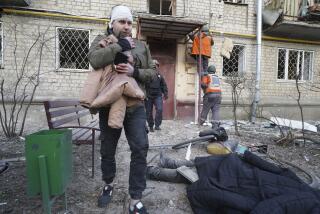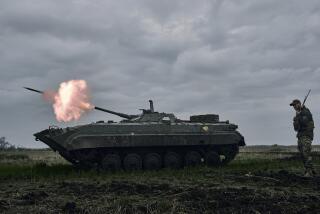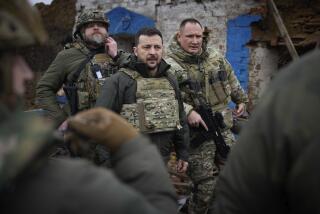Ukraine’s opposition celebrates as prime minister steps down
KIEV, Ukraine — Ukraine’s political opposition celebrated the first major victory in its two-month-long standoff with the government as the country’s prime minister tendered his resignation Tuesday. But the move appeared unlikely to end the crisis.
Mykola Azarov’s resignation came after a week of violent clashes in Kiev, the capital, in which at least four activists were killed, dozens arrested and hundreds injured on both sides. It was the worst street violence in the history of post-Soviet Ukraine.
A short time after his announcement, the parliament rescinded unpopular anti-protest laws in another peace offering to opposition forces bent on the ouster of President Viktor Yanukovich.
Opposition leaders had been negotiating with Yanukovich for four days, demanding that he call elections for the presidency and parliament. In a statement published on the Cabinet’s official website, Azarov said that “the scope of the acute and dangerous conflict” compelled him to resign in the hope of enabling a political compromise.
“We have been doing everything to prevent bloodshed, escalation of violence, violations of citizens’ rights,” the statement said. “For all these difficult years I have been doing my best for Ukraine to develop normally as a democratic European state.”
Word of the resignation was met with loud cheers from the thousands of protesters at a tent camp in Independence Square, a staging area for antigovernment protests, as well as those along barricades in central Grushevsky Street, the battlefield of recent days.
“It is good news but we will not go away until all our demands are met,” said young protester Maxim Ivashchenko, whose face was blackened by the soot of street fires. “Now we want Yanukovich to go, and we want the murderers of our comrades punished.”
Opposition leader Vitali Klitschko said Azarov resigned “to save face” before he was forced to leave.
“The resignation of the premier is a step toward the opposition’s victory but it is not a victory yet,” Klitschko said to reporters during a special parliamentary session. The lawmaker said the demonstrations would end only “if the authorities fulfill the demands of the society, meaning a complete change of state power.”
Yanukovich had proposed a compromise deal over the weekend in which opposition leader Arseny Yatsenyuk would take the premier’s job and Klitschko the position of deputy premier. They declined.
The resignation of Azarov, who has led the government since 2010, was one of the key demands of opposition leaders, who held him responsible, along with Yanukovich, for backing away from closer ties with the European Union in November in favor of a cozier relationship with Russia.
Russian President Vladimir Putin insisted that he was not bothered by Azarov’s resignation. Even if the opposition assumes power, Russia will not reconsider its agreements to lend money to Ukraine and give it a break on energy prices, he said during a news conference in Brussels.
“It is not important to us,” he said. “We did conduct a constructive dialogue with the government of [jailed former Prime Minister] Yulia Tymoshenko.”
Putin’s remarks suggest that even he sees the resignation as a positive step, political scientist Igor Popov said.
“Now the most important problem for the opposition leaders is to persuade the radical protesters to start leaving the barricades,” said Popov, president of a Kiev-based think tank. “But all [the protesters] want is the resignation of Yanukovich himself.”
For the moment, however, the opposition was basking in its victory, particularly after the parliament revoked the recently passed legislation that outlawed many of the tactics used by protesters. Opposition leaders continued to press lawmakers to release jailed demonstrators.
“I approve of any news which could prevent further bloodshed,” said a police officer standing in full riot gear about 60 yards from the protesters. “People out there are not our enemies. They are our brothers.”
More to Read
Start your day right
Sign up for Essential California for news, features and recommendations from the L.A. Times and beyond in your inbox six days a week.
You may occasionally receive promotional content from the Los Angeles Times.






